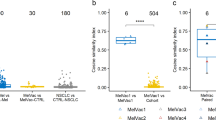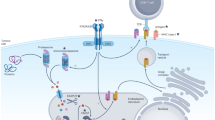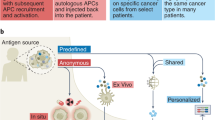Abstract
The cloning of the genes encoding cancer antigens has opened new possibilities for the treatment of patients with cancer. In this study, immunodominant peptides from the gp100 melanoma-associated antigen were identified, and a synthetic peptide, designed to increase binding to HLA-A2 molecules, was used as a cancer vaccine to treat patients with metastatic melanoma. On the basis of immunologic assays, 91% of patients could be successfully immunized with this synthetic peptide, and 13 of 31 patients (42%) receiving the peptide vaccine plus IL-2 had objective cancer responses, and four additional patients had mixed or minor responses. Synthetic peptide vaccines based on the genes encoding cancer antigens hold promise for the development of novel cancer immunotherapies.
This is a preview of subscription content, access via your institution
Access options
Subscribe to this journal
Receive 12 print issues and online access
$259.00 per year
only $21.58 per issue
Buy this article
- Purchase on SpringerLink
- Instant access to the full article PDF.
USD 39.95
Prices may be subject to local taxes which are calculated during checkout
Similar content being viewed by others
References
Rosenberg, S.A. The development of new cancer therapies based on the molecular identification of cancer regression antigens. Cancer. Sci. Am. 1, 89–100 (1995).
Boon, T. Tumor antigens recognized by cytolytic T lymphocytes: Present perspectives for specific immunotherapy. Int. J. Cancer 54, 177–180 (1993).
Rosenberg, S.A. et al. Use of tumor infiltrating lymphocytes and interleukin-2 in the immunotherapy of patients with metastatic melanoma: Preliminary report. N. Engl. J. Med. 319, 1676–1680 (1988).
Rosenberg, S.A. et al. Treatment of patients with metastatic melanoma using autologous tumor-infiltrating lymphocytes and interleukin-2. J. Natl. Cancer Inst 86, 1159–1166(1994).
Kawakami, Y. et al. Identification of a human melanoma antigen recognized by tumor infiltrating lymphocytes associated with in vivo tumor rejection. Proc. Natl. Acad. Sci. USA 91, 6458–6462 (1994).
Kawakami, Y. et al. Cloning of the gene coding for a shared human melanoma antigen recognized by autologous T cells infiltrating into tumor. Proc. Natl. Acad. Sci. USA 91, 3515–3519(1994).
Kawakami, Y. et al. Identification of the immunodominant peptides of the MART-1 human melanoma antigen recognized by the majority of HLA-A2 restricted tumor infiltrating lymphocytes. Exp. Med. 180, 347–352 (1994).
Kawakami, Y. et al. Recognition of multiple epitopes in the human melanoma antigen gp100 by tumor infiltrating T-lymphocytes associated with in vivo tumor regression. J. Immunol. 154, 3461–3968 (1995).
Parkhurst, M.R. et al. Improved induction of melanoma reactive CTLs with peptides from the melanoma antigen gp100 modified at HLA-A*0210 binding residues. J. Immunol. 157, 2537–2548 (1996).
Rivoltini, L. et al. Induction of tumor-reactive CTLs from peripheral blood and tumor-infiltrating lymphocytes of melanoma patients by in vitro stimulation with an immunodominant peptide of the human melanoma antigen MART-1. J. Immunol. 54, 2257–2265 (1995).
Salgaller, M.L. et al. Recognition of multiple epitopes in the human melanoma antigen gpi 00 by peripheral blood lymphocytes stimulated in vitro with synthetic peptides. Cancer Res. 55, 4972–4979 (1995).
Marincola, F.M., Rivoltini, L., Salgaller, M.L., Player, M. & Rosenberg, S.A. Differential anti-MART-1/MelanA CTL activity in peripheral blood of HLA-A2 melanoma patients in comparison to healthy donors: Evidence for in vivo priming by tumor cells. J. Immunother. 19, 266–277 (1996).
Cormier, J.N. et al. Enhancement of cellular immunity in melanoma patients immunized with a peptide from MART-1 /Melan A. Cancer J. Sci. Am. USA 3, 37–44 (1996).
Salgaller, M.L., Marincola, F.M., Cormier, J.N., & Rosenberg, S.A. Immunization against epitopes in the human melanoma antigen gp100 following patient immunization with synthetic peptides. Cancer Res. 56, 4749–4757 (1996).
Aichele, P., Hengartner, H., Zinkergnagel, R.M., & Schulz, M. Antiviral cytotoxic T cell response induced by in vivo priming with a free synthetic peptide. Exp. Med. 171, 815–1820(1990).
Kast, W.M. et al. Protection against lethal sendai virus infection by in vivo priming of virus-specific cytotoxic T lymphocytes with a free synthetic peptide. Proc. Natl. Acad. Sci. USA 88, 2283–2287 (1991).
Celluzzi, C.M., Mayorodomo, J.I., Storkus, W.J., Lotze, M.X., & Falo, L.D. Peptide-pulsed dendritic cells induced antigen-specific, CTL-mediated protective tumor immunity. J. Exp. Med. 183, 283–287 (1996).
Mandelboim, O. et al. CTL induction by a tumour-associated antigen octapeptide derived from a murine lung carcinoma. Nature 369, 67–71 (1994).
Deres, K., Schild, H., Weismuller, K.-H., Jung, C., & Rammensee, H.-G. In vivo priming of virus-specific cytotoxic T lymphocytes with synthetic lipopetide vaccine. Nature 342, 561 564 (1989).
Lasarte, J.-J., Sarobe, P., Gullon, A., Prieto, J., & Borras-Cuesta, F. Induction of cytotoxic T lymphocytes in mice against the principal neutralizing domain of HIV-1 by immunization with an engineered T-cytotoxic-T-Helper synthetic peptide construct. Cell Immunol. 141, 211–218 (1992).
Shirai, M. et al. Helper-cytotoxic T lymphocyte (CTL) determinant linkage required for priming of anti-HIV CD8+ CTL in vivo with peptide vaccine constructs. J. Immunol. 152, 549–556 (1994).
Minev, B.R., Restifo, N.P., McFarland, B.J., Spiess, P.J., & Rosenberg, S.A. Insertion signal sequence fused to minimal peptides elicits specific CD8+ T-cell responses and prolongs survival of thymoma-bearing mice. Cancer Res. 54, 4155–4161 (1994).
Noguchi, Y., Richards, E.C., Chen, Y.T., & Old, L.J. Influence of interleukin-12 on p53 peptide vaccination against established Meth A sarcoma. Proc. Natl. Acad. Sci. USA 92, 2219–2223 (1995).
Kyburz, D. et al. T cell immunity after a viral infection versus T cell tolerance induced by soluble viral peptides. Eur. J. Immunol. 23, 1956–1962 (1993).
Hu, X. et al. Enhancement of cytolytic T lymphocyte precursor frequency in melanoma patients following immunization with the MAGE-1 peptide loaded antigen presenting cell-based vaccine. Cancer Res. 56, 2479–2483 (1996).
Jaeger, E. et al. Generation of cytotoxic T-cell responses with synthetic melanoma-associated peptides in vivo: Implications for tumor vaccines with melanoma-associated antigens. Int. J. Cancer 66, 162–169 (1996).
Jaeger, E. et al. Granulocyte-macrophage-colony-stimulating factor enhances immune responses to melanoma-associated peptides in vivo. Int. J. Cancer 67, 54–62 (1996).
Marchand, M. et al. tumor regression responses in melanoma patients treated with a peptide encoded by gene MAGE-3 [Letter to the Editor]. Int. J. Cancer 63, 883–885(1995).
Rosenberg, S.A. et al. Treatment of 283 consecutive patients with metastatic melanoma or renal cell cancer using high-dose bolus interleukin-2. JAMA 271, 907–913(1994).
Coulie, P. et al. Precursor frequency analysis of human cytolytic T lymphocytes directed against autologous melanoma cells. Int. J. Cancer 50, 289–297 (1992).
Mazzocchi, A. et al. Frequency of cytotoxic T lymphocyte precursors (CTLp) interacting with autologous tumor via the T-cell receptor: Limiting dilution analysis of specific CTLp in peripheral blood and tumor-invaded lymph nodes of melanoma patients. Int. J. Cancer 58, 330–339 (1994).
Herr, W., Wolfel, T., Heike, M., Meyer zun Buschenfelde, K.-H., & Knuth, A. Frequency analysis of tumor-reactive cytotoxic T lymphocytes in peripheral blood of a melanoma patient vaccinated with autologous tumor cells. Cancer Immunol. Immunother. 39, 93–99 (1994).
Sharrock, C.E.M., Kaminski, E. E, & Man, S. Limiting dilution analysis of human T cells: A useful clinical tool. Immunol. Today 11, 281–286 (1990).
Gomez, I.B.A., Gomard, E., & Levy, J.P. Limiting-dilution analysis of the HLA restriction of anti-Epstein-Barr virus-specific cytolytic T lymphocytes. Clin. Exp. Immunol. 84, 501–507(1991).
Vasilakos, J.P., & Michael, J.G. Herpes simplex virus class l-restricted peptide induces cytotoxic T lymphocytes in vivo independent of CD4+ T cells. J. Immunol. 150, 2346–2355 (1993).
Bronte, V. et al. IL-2 enhances the function of recombinant proxvirus- based vaccines in the treatment of established pulmonary metastases. J. Immunol. 154, 4282–5292(1995).
Irvine, K.R., Roa, R.B., Rosenberg, S.A., & Restifo, N.P. Cytokine enhancement of DNA immunization leads to treatment of established pulmonary metastases. J. Immunol. 156, 238–245 (1996).
Rao, J.B. et al. Interleukin-12 is an effective adjuvant to recombinant vaccinia virus based tumor vaccines. J. Immunol. 156, 3357–3365 (1996).
Author information
Authors and Affiliations
Rights and permissions
About this article
Cite this article
Rosenberg, S., Yang, J., Schwartzentruber, D. et al. Immunologic and therapeutic evaluation of a synthetic peptide vaccine for the treatment of patients with metastatic melanoma. Nat Med 4, 321–327 (1998). https://doi.org/10.1038/nm0398-321
Received:
Accepted:
Issue date:
DOI: https://doi.org/10.1038/nm0398-321
This article is cited by
-
The synergetic effects of 4-nonylphenol and polyethylene microplastics in Cyprinus carpio juveniles using blood biomarkers
Scientific Reports (2023)
-
Identification of promising CD8 and CD4 T cell epitopes for peptide vaccine formulation against SARS-CoV-2
Archives of Microbiology (2022)
-
Identification and characterization of heteroclitic peptides in TCR-binding positions with improved HLA-binding efficacy
Journal of Translational Medicine (2021)
-
Therapeutic vaccination targeting CD40 and TLR3 controls melanoma growth through existing intratumoral CD8 T cells without new T cell infiltration
Cancer Immunology, Immunotherapy (2021)
-
Mixed 20-peptide cancer vaccine in combination with docetaxel and dexamethasone for castration-resistant prostate cancer: a randomized phase II trial
Cancer Immunology, Immunotherapy (2020)



